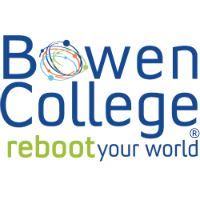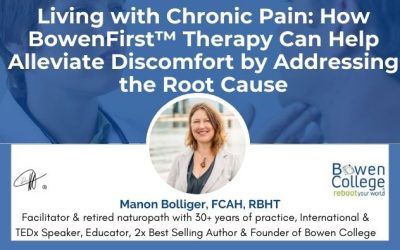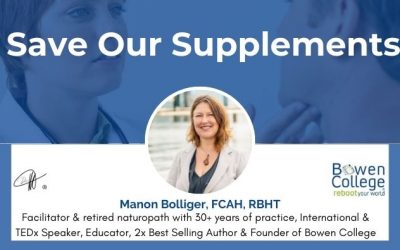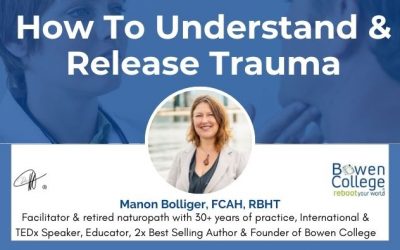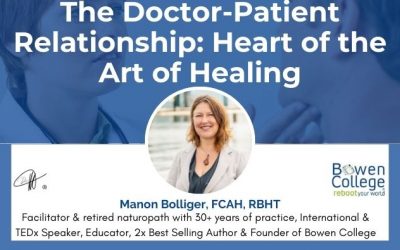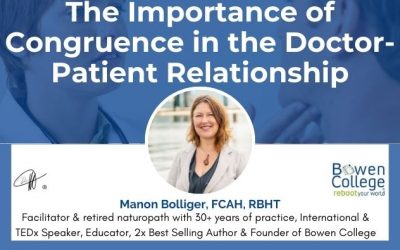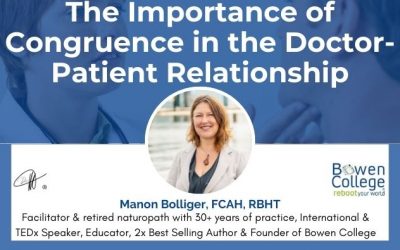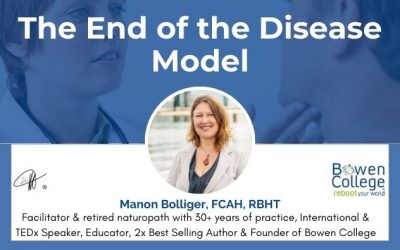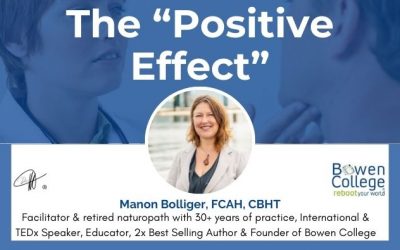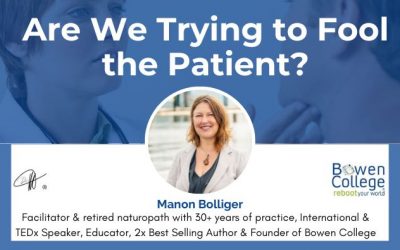News from the Bowen College community
Bowen College is committed to patient-centered, pain-free care. Read news from our community.

Subscribe to the Bowen College blog to read the latest updates for holistic, patient-centered care
Living with Chronic Pain: How BowenFirst™ Therapy Can Help Alleviate Discomfort by Addressing the Root Cause
Chronic pain is a complex and often debilitating condition that affects millions of people worldwide. Unlike acute pain, which is usually a direct response to an injury or illness, chronic pain persists long after the initial cause has healed. This persistent pain can...
Understanding BowenFirst™ Therapy A Gentle Approach to Holistic Healing
In the realm of holistic therapies, BowenFirst™ Therapy stands out for its unique approach to healing. This gentle, non-invasive therapy has gained recognition for its effectiveness in addressing a wide range of health issues. Whether you're new to BowenFirst™ Therapy...
Healthcare Has to be Personal to Work
pre-med training, four-year full time study in naturopathic medicine, and seven years of post-graduate training in homeopathic medicine and Bowen therapy, it turned out that none of these paths – in allopathy, naturopathy, homeopathy, physical therapies, or psychological approaches – offered me a clear solution. No stand-alone therapy was complete without my full presence and engagement with it. I had to overcome all my objections and look at my belief system, investigate the operating presumptions before I could “surrender” into any approach at all.
My Personal Journey of “Dis-ease”
Today, I am at peace with my health. I have “found myself” on this journey. I am free of scoliosis, tuberculosis, multiple sclerosis, and cancer, and I am living a life full of happiness and gratitude. I have realized that healing is about living life with consciousness and presence. Since 1992 I’ve helped thousands of patients and trained hundreds of students to achieve optimum health and to engage fully in their lives. In the series of posts to come, I’ll share those insights with you.
Save Our Supplements
We Need To Keep Up The Fight To Save Our Supplements The fight to Save Our Supplements is not over yet — Health Canada continues to rush through new laws and significant fees to import, manufacture and sell Canadian-regulated Natural Health Products (NHPs),...
Your Health Choices
Our Private Member’s Bill made it to the House of Commons! SHAWN BUCKLEY DRAFTED A PRIVATE MEMBER’S BILL While you were busy writing letters and sending postcards to educate our MPs, Shawn Buckley was busy drafting a new Private Member’s Bill to repeal sections...
Healthcare Paradigm as Social Justice
Medicine is not the only field experiencing these major shifts of perception. In fact, no field or profession is exempt from its skeptics, philosophers, or innovators. Take the field of law.
Embrace The New Paradigm
Embrace The New ParadigmIn my book, What Patients Don’t Say, If Doctors Don’t Listen, I discussed how the day-to-day challenges of our practices can wear down the initial inspiration to heal for many healthcare professionals. It doesn’t need to be that way, though....
Break Out Of Your Old Habits
how do we break out of our old cyclical habits and get there? With fear and uncertainty in our way, building walls of shame and anxiety… gaining back our health can sometimes seem and feel like an impossible destination. How can we find time to incorporate a new lifestyle into our day-to-day when we are busy with work and family responsibilities?
How To Understand & Release Trauma
35 women came together to ‘share their stories about being assaulted by Bill Cosby and the culture that wouldn’t listen.’ (NY Times) This represents a turning point on how our society views and understands the different types of trauma that exist. Now, particularly online ‘there is a strong sense that speaking up is the only right thing to do, that a women claiming her own victimhood is more powerful than any other weapon in the fight against rape’(NY Times) and healing from trauma.
Are Doctor’s Tongues/Hands Tied?
Many have a personal story, often of a family member or relative who suffered. Whether or not they died or were “saved,” a light was turned on because of their experience. The practitioner enters the field of medicine driven by a desire to help others or find a solution to unresolved health issues.
The Doctor-Patient Relationship: Heart of the Art of Healing
As we have seen, therapeutic effect is increased if the patient is aligned with the treatment and has positive reinforcement for the outcomes. Research confirms the beneficial effects of patients’ increased control over their health and body. Approaches to treatment...
Congruence and Context Make the Difference
Over the course of these blog posts, I hope we’ve learned the importance of congruence, context, and expectation in treatment. These are all factors established in relationship and cannot be “objectively” measured. Further, it is not what we do that matters; it is the...
The Importance of Congruence in the Doctor-Patient Relationship
This blog’s discussions of the limits of SOAP remind us that the “plan” is a journey. The destination is a doctor-patient relationship built on congruence of perception, aim and method: key to aligning for success. When discussing placebo, M.J. Simmonds (2000) states:...
The End of the Disease Model
Over this series of blog post, I hope I’ve convinced you the SOAP form is fraught with the assumptions that lie at the base of conventional medicine. In fact, it has spawned a “relationship” between the doctor and the patient that is neither conducive to the...
The Health Practitioner’s Journey
“The science of medicine must be deployed to elucidate the art of medicine; otherwise, medicine falls short, both as science and art.” (Miller & Colloca, 2011) I set a mission for myself when I began this blog. It has been a long journey, lasting several years....
On The Virtues of Patients Being Informed and Empowered, Pt 2
In my last post I discussed the findings of a set of vertebroplasty studies that revealed the power of the positive “placebo” effect of informed patients. Let me quote at length one research group’s evaluation: “The power of information disclosure to influence patient...
On The Virtues of Patients Being Informed and Empowered, Pt 1
Over the next couple posts I’m going to discuss a case study that casts a helpful light upon our recent discussion of the so-called placebo type positive effect resulting from a treatment approach that privileges informing and empowering patients. In this study on...
Aligning Emotional Energy to Treatment
Is there something that has yet to be better understood that takes place when a patient engages in a course of treatment? According to Milton Cohen, when considering pain there is, “The self-referentiality of living systems (through their qualities of autopoiesis,...
The “Positive Effect”
As we’ve seen over the last couple posts, the placebo effect discussion is a little more complicated than seems at first flush. We could redefine the “placebo effect” as the “aligned and committed effect” or the “positive effect.” Unwarranted, preconceived negatives...
Placebo Ethics?
In the last post we discussed how research on the placebo effect complicated a lot of assumptions about pharmacological research. But if the manifestations of improved health are not a result of physiological effects, it’s fair to ask: if we’re not the disease, are we...
Placebo Power?
We left off the last post pointing out the ethical quandary around using the placebo effect for therapeutic purposes. Consider the fact that as NDs, “Do no Harm” is a fundamental tenet of our practice. Everything else aside, if the results are similar whether or not...
Are We Trying to Fool the Patient?
In the last post, we saw widespread findings showing a pervasive placebo effect with the use of pharmacological treatments. What do these findings tell us? Why all these variable results? If drugs are supposed to have a predictable result on certain pathways or for...
The Placebo Effect
In Sheather-Reid’s 1990s study on efficacy of pain relief agents, the agents used were opioids and non-opioid analgesics (such as nonsteroidal anti-inflammatory drugs and acetaminophen (paracetamol)) to examine the analgesic efficacy of the opioid agonist codeine...
